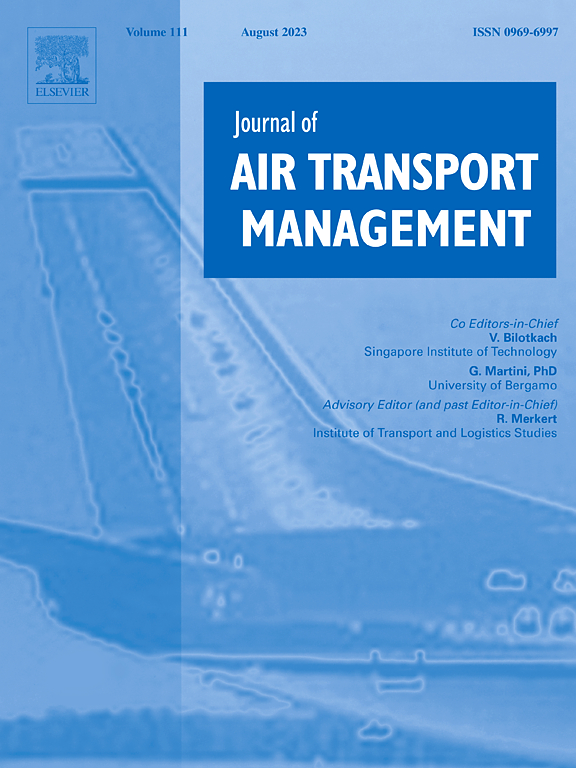考虑异质性的航空公司能源效率测量
IF 3.6
2区 工程技术
Q2 TRANSPORTATION
引用次数: 0
摘要
近年来,以劳动力成本上升、燃油价格波动、全球经济放缓为特征,在这一系列内外部风险的影响下,航空公司的生存和发展面临危机。因此,密切关注全球航空公司的效率是至关重要的。目前,大多数研究没有考虑航空公司的异质性,将所有类型的航空公司作为同质决策单元进行效率评价。航空公司能源效率评价结果存在偏差。本研究将meta-frontier模型与基于epsilon测度(EBM)模型相结合,对航空公司的效率进行测度,同时打开航空公司的内部运营流程,分析航空效率——公司运营、服务和销售三个阶段的效率。结果表明:运营阶段的效率值最低,运营阶段的高效航空公司数量最少;大多数航空公司的低效率来自运营阶段。元边界下的效率不超过群边界下的相应效率,忽略异质性的影响会使航空公司的能效评价产生偏差。本文章由计算机程序翻译,如有差异,请以英文原文为准。
Airline energy efficiency measurement considering heterogeneity
Characterized by rising labor costs, volatile fuel prices, and a slowdown in the global economy in recent years, the survival and development of airlines are facing a crisis under the influence of this series of internal and external risks. Therefore, it is essential to pay close attention to the efficiency of airlines worldwide. Currently, most studies do not consider the heterogeneity of airlines and treat all types of airlines as homogeneous decision-making units for efficiency evaluation. The results of the airline energy efficiency evaluation are biased. In this study, the meta-frontier model and the Epsilon-Based Measure (EBM) model are combined to measure the efficiency of airlines and, at the same time, open the internal operation process of the airline and analyze the aviation efficiency—three-stage efficiency of company operations, services, and sales. The results show that the efficiency value of the operation stage is the lowest, and the number of high-efficiency airlines in the operation stage is the least. Most airlines' inefficiency comes from the Operations stage. The efficiency under the meta-frontier does not exceed the corresponding efficiency under the group frontier, and ignoring the impact of heterogeneity will bias the airline's energy efficiency evaluation.
求助全文
通过发布文献求助,成功后即可免费获取论文全文。
去求助
来源期刊

Journal of Air Transport Management
TRANSPORTATION-
CiteScore
12.40
自引率
11.70%
发文量
97
期刊介绍:
The Journal of Air Transport Management (JATM) sets out to address, through high quality research articles and authoritative commentary, the major economic, management and policy issues facing the air transport industry today. It offers practitioners and academics an international and dynamic forum for analysis and discussion of these issues, linking research and practice and stimulating interaction between the two. The refereed papers in the journal cover all the major sectors of the industry (airlines, airports, air traffic management) as well as related areas such as tourism management and logistics. Papers are blind reviewed, normally by two referees, chosen for their specialist knowledge. The journal provides independent, original and rigorous analysis in the areas of: • Policy, regulation and law • Strategy • Operations • Marketing • Economics and finance • Sustainability
 求助内容:
求助内容: 应助结果提醒方式:
应助结果提醒方式:


